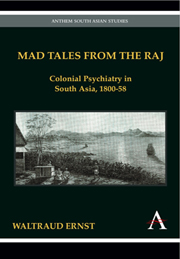Book contents
- Frontmatter
- Contents
- List of Illustrations
- Preface
- Chapter 1 Introduction: Colonizing the Mind
- Chapter 2 Madness and the Politics of Colonial Rule
- Chapter 3 The Institutions
- Chapter 4 The Medical Profession
- Chapter 5 The Patients
- Chapter 6 Medical Theories and Practices
- Chapter 7 Conclusion: ‘Mad Dogs and Englishmen…’
- Primary Sources
- Notes
- Index
Chapter 1 - Introduction: Colonizing the Mind
Published online by Cambridge University Press: 05 March 2012
- Frontmatter
- Contents
- List of Illustrations
- Preface
- Chapter 1 Introduction: Colonizing the Mind
- Chapter 2 Madness and the Politics of Colonial Rule
- Chapter 3 The Institutions
- Chapter 4 The Medical Profession
- Chapter 5 The Patients
- Chapter 6 Medical Theories and Practices
- Chapter 7 Conclusion: ‘Mad Dogs and Englishmen…’
- Primary Sources
- Notes
- Index
Summary
Some ‘mysterious transformation’ is said to have affected Westerners once they proceeded East of Suez. The view that experience of life in an alien Eastern country set travellers and expatriates apart from their fellow countrymen was common amongst those who reflected upon the effect on generations of Europeans of life in the Orient. So much was the East—West encounter perceived as leaving its mark on people's personality that those who had lived in the Orient for some time were regarded as a ‘distinct species’. Their peculiar views, attitudes and behaviour were both excused and explained by reference to life abroad and on return to Europe they were treated ‘either with awed bewilderment or humorous ridicule’. What sparked off this ‘mysterious transformation’ has since the eighteenth century been subject to speculation. Some assumed that it was the alien environment that was to blame, in that polite manners and sociable behaviour were ‘jungled out’ of those exposed to prolonged life in the tropical forests and arid plains of the Indian peninsula. Others were inclined to see the lack of ‘restraint of parents, relatives and friends’ as upsetting the mental balance and emotional inhibition of a number of those young, predominantly male, griffins, or green newcomers who, being ‘thrown together’ with others of their age, became ‘violent and intractable’.
- Type
- Chapter
- Information
- Mad Tales from the RajColonial Psychiatry in South Asia, 1800–58, pp. 1 - 10Publisher: Anthem PressPrint publication year: 2010

